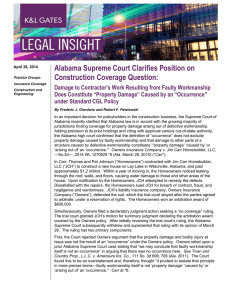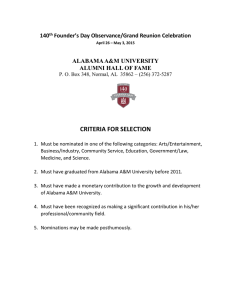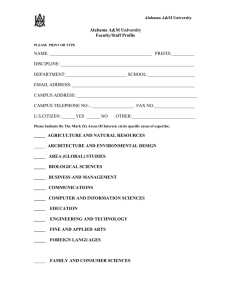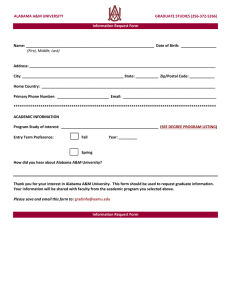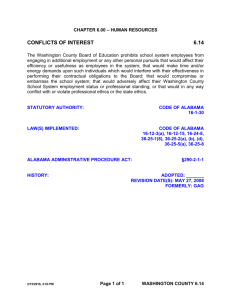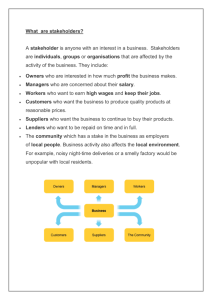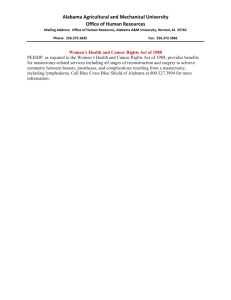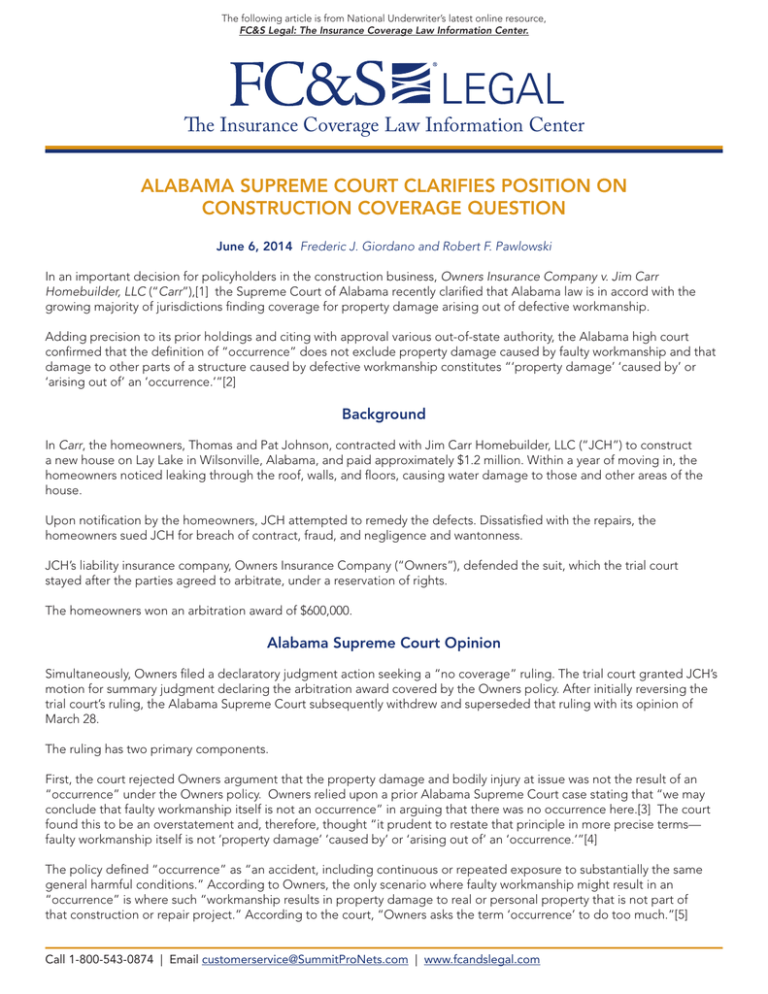
The following article is from National Underwriter’s latest online resource,
FC&S Legal: The Insurance Coverage Law Information Center.
The Insurance Coverage Law Information Center
ALABAMA SUPREME COURT CLARIFIES POSITION ON
CONSTRUCTION COVERAGE QUESTION
June 6, 2014 Frederic J. Giordano and Robert F. Pawlowski
In an important decision for policyholders in the construction business, Owners Insurance Company v. Jim Carr
Homebuilder, LLC (“Carr”),[1] the Supreme Court of Alabama recently clarified that Alabama law is in accord with the
growing majority of jurisdictions finding coverage for property damage arising out of defective workmanship.
Adding precision to its prior holdings and citing with approval various out-of-state authority, the Alabama high court
confirmed that the definition of “occurrence” does not exclude property damage caused by faulty workmanship and that
damage to other parts of a structure caused by defective workmanship constitutes “‘property damage’ ‘caused by’ or
‘arising out of’ an ‘occurrence.’”[2]
Background
In Carr, the homeowners, Thomas and Pat Johnson, contracted with Jim Carr Homebuilder, LLC (“JCH”) to construct
a new house on Lay Lake in Wilsonville, Alabama, and paid approximately $1.2 million. Within a year of moving in, the
homeowners noticed leaking through the roof, walls, and floors, causing water damage to those and other areas of the
house.
Upon notification by the homeowners, JCH attempted to remedy the defects. Dissatisfied with the repairs, the
homeowners sued JCH for breach of contract, fraud, and negligence and wantonness.
JCH’s liability insurance company, Owners Insurance Company (“Owners”), defended the suit, which the trial court
stayed after the parties agreed to arbitrate, under a reservation of rights.
The homeowners won an arbitration award of $600,000.
Alabama Supreme Court Opinion
Simultaneously, Owners filed a declaratory judgment action seeking a “no coverage” ruling. The trial court granted JCH’s
motion for summary judgment declaring the arbitration award covered by the Owners policy. After initially reversing the
trial court’s ruling, the Alabama Supreme Court subsequently withdrew and superseded that ruling with its opinion of
March 28.
The ruling has two primary components.
First, the court rejected Owners argument that the property damage and bodily injury at issue was not the result of an
“occurrence” under the Owners policy. Owners relied upon a prior Alabama Supreme Court case stating that “we may
conclude that faulty workmanship itself is not an occurrence” in arguing that there was no occurrence here.[3] The court
found this to be an overstatement and, therefore, thought “it prudent to restate that principle in more precise terms—
faulty workmanship itself is not ‘property damage’ ‘caused by’ or ‘arising out of’ an ‘occurrence.’”[4]
The policy defined “occurrence” as “an accident, including continuous or repeated exposure to substantially the same
general harmful conditions.” According to Owners, the only scenario where faulty workmanship might result in an
“occurrence” is where such “workmanship results in property damage to real or personal property that is not part of
that construction or repair project.” According to the court, “Owners asks the term ‘occurrence’ to do too much.”[5]
Call 1-800-543-0874 | Email customerservice@SummitProNets.com | www.fcandslegal.com
The court continued:
If some portion of the Owners policy seeks to affect coverage by references to the nature or location of the
property damaged, it is not the provision of the policy for coverage of occurrences. The policy simply does not
define ‘occurrence’ by reference to such criteria.[6]
Thus, the definition of “occurrence” did not, in and of itself, exclude the alleged property damage.
Second, the court considered Owners’ argument that the “your work” exclusion in the policy precluded coverage.
That exclusion stated:
This insurance does not apply to … Damage To Your Work … ”Property damage” to ”your work” arising out of it or any
part of it and included in the ”products-completed operations hazard.”
(Emphasis in original.)
The court rejected this argument as well. ”As the emphasized passage makes clear, in order for the ‘Your Work’ exclusion
to apply, the damage not only must be to ‘your work,’ but also must be ‘included’ in the ‘products-completed operations
hazard.’”[7] Since it was not, the exclusion did not apply.
The court further agreed with the Homeowners argument that, if true, Owners’ argument that the “home and every component of the home is the ‘work’ of JCH” and thus excluded, would render Owners “guilty of issuing illusory coverage.”[8]
Conclusion
Although the decision in Carr does not necessarily create new precedent in Alabama, it eliminates uncertainty as to
whether and when coverage exists under Alabama law for property damage caused by defective workmanship under
standard-type commercial general liability (“CGL”) insurance policies.
Although application in any particular case may be fact-sensitive, and various exclusions contained in a CGL policy may
nonetheless bar coverage, Alabama now more clearly sides with the majority of states holding that the definition of
“occurrence” does not exclude property damage caused by faulty workmanship, and that damage to other parts of a
structure caused by defective workmanship constitutes “property damage” under such policies.
Policyholders facing construction-related claims under policies governed by Alabama law should understand the rules
to assess how to maximize their insurance recovery.
Notes
[1] Owners Insurance Company v. Jim Carr Homebuilder, LLC, ---So.3d---, 2014 WL 1270629 (Ala. March 28, 2014).
[2] Id. at *6.
[3] See Town and Country Prop., L.L.C. v. Amerisure Ins. Co., 111 So. 3d 699, 706 (Ala. 2011).
[4] Carr at *6.
[5] Carr at *5.
[6] Id., citing Lamar Homes v. Mid-Continent Cas. Co., 242 S.W.3d 1 (Tex. 2007).
[7] Carr at *7.
[8] Id. The policy in Carr did not have the “subcontractor exception” to the “your work” exclusion found in many liability
policies. See e.g., ISO Commercial General Liability Coverage Form CG 00 01 04 13 (“This exclusion does not apply if the
damaged work or the work out of which the damage arises was performed on your behalf by a subcontractor.”).
Call 1-800-543-0874 | Email customerservice@SummitProNets.com | www.fcandslegal.com
About the Authors
Frederic J. Giordano is a partner at K&L Gates LLP focusing his practice on complex civil and commercial litigation, with
an emphasis on representing policyholders in insurance coverage matters.
Robert F. Pawlowski is counsel at K&L Gates LLP concentrating his practice on complex commercial litigation, with an
emphasis on representing policyholders in insurance coverage matters.
Resident in the firm’s Newark, New Jersey, office, the authors may be contacted at frederic.giordano@klgates.com and
robert.pawlowski@klgates.com, respectively.
For more information, or to begin your free trial:
• Call: 1-800-543-0874
• Email: customerservice@SummitProNets.com
• Online: www.fcandslegal.com
FC&S Legal guarantees you instant access to the most authoritative and comprehensive
insurance coverage law information available today.
This powerful, up-to-the-minute online resource enables you to stay apprised
of the latest developments through your desktop, laptop, tablet, or smart phone
—whenever and wherever you need it.
NOTE: The content posted to this account from FC&S Legal: The Insurance Coverage Law Information Center is current to the date of its initial
publication. There may have been further developments of the issues discussed since the original publication.
This publication is designed to provide accurate and authoritative information in regard to the subject matter covered. It is sold with the understanding
that the publisher is not engaged in rendering legal, accounting or other professional service. If legal advice is required, the services of a competent
professional person should be sought.
Copyright © 2014 The National Underwriter Company. All Rights Reserved.
Call 1-800-543-0874 | Email customerservice@SummitProNets.com | www.fcandslegal.com

